The Madoka Legacy: A Brief Review of Puella Magi Madoka Magica
Over the years we have spectacular series that are strong contesters for the title of best anime series since the critically and notoriously acclaimed Neon Genesis Evangelion (1995): The Melancholy of Haruhi Suzumiya (2006) makes Kyoto Animation a household name among anime fans; Code Geass (2006) takes many people’s breaths away with its intensity; Bakemonogatari (2009) has fantastic motion graphics and an awkwardly wonderful confession scene; and Shinsekai Yori (2012) is a piece of underrated gem that explores human psyche and social class system. Still, while all these series and many others are excellent, none of them can quite compare to the hype and success of Puella Magi Madoka Magica (2011), the show that became an instant classic and a social phenomenon since its release.
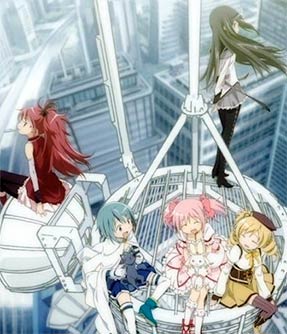 What? You don’t believe me? How about the fact that following the broadcast of the infamous episode 3, the popular forum 2ch achieved a record-breaking number of posts discussing the anime? Or that after a brief broadcast suspension due to the 2011 Tohoku earthquake, the production company advertised the broadcast of the last two episodes on Yomiuri Shimbun, a national newspaper in Japan? Or that even politicians dressed up as characters from the show before an election? (Even a petition on change.org is on its way to rename a nebula after Madoka.) The first Blu-ray Disc volume sold more than 50,000 copies in the first week of sales, breaking the original record held by Bakemonogatari, and only to be surpassed a month later – by its own second volume. It even has its own bi-monthly magazine. A movie adaptation is on its way, with two movies retelling the anime series, and a new, original story to be released on 26th October, 2013.
What? You don’t believe me? How about the fact that following the broadcast of the infamous episode 3, the popular forum 2ch achieved a record-breaking number of posts discussing the anime? Or that after a brief broadcast suspension due to the 2011 Tohoku earthquake, the production company advertised the broadcast of the last two episodes on Yomiuri Shimbun, a national newspaper in Japan? Or that even politicians dressed up as characters from the show before an election? (Even a petition on change.org is on its way to rename a nebula after Madoka.) The first Blu-ray Disc volume sold more than 50,000 copies in the first week of sales, breaking the original record held by Bakemonogatari, and only to be surpassed a month later – by its own second volume. It even has its own bi-monthly magazine. A movie adaptation is on its way, with two movies retelling the anime series, and a new, original story to be released on 26th October, 2013.
Embracing and defying expectations
When Madoka first came out, I thought it was just another magical girl series: teenage girls becoming magical girls and fighting against evil powers that wanted to take over the world. The production cast looked appealing enough, with Akiyuki Shinbo (Sayonara Zetsubo Sensei, Bakemonogatari) as director, Gen Urobuchi (Fate/Zero, PsychoPass) as writer, Yuki Kajiura (Tsubasa Chronicle, Sword Art Online; producer of Kalafina’s albums) as composer, and Ume Aoki as character designer. They are all famous figures in the anime industry, and one was left to wonder how these four could make a dated genre interesting to watch.
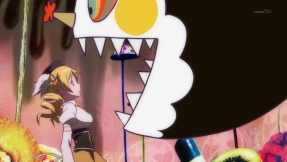
They certainly did not disappoint. The graphics and storyboards were great. The character design looked a bit strange, but acceptable. The mouth-less Kyubey looked cute enough and seemingly served as a guiding figure to the magical girls, like Cerberus did in Cardcaptor Sakura (1998). Homura Akemi looked like the antagonist here, when she’s doing all she could to stop Madoka Kaname from becoming a magical girl. The first couple episodes showed us the glamorous side of being a magical girl: with Mami Tomoe as an example, a magical girl looked strong, beautiful, and reliable. If you could have any wish fulfilled, in exchange of being a magical girl to save others, that didn’t sound like a bad deal, did it?
Three episodes onward, it completely deconstructed the magical girl genre as we know it, just like Evangelion changed what mecha-robot fight meant. We realized that this was not a show about happy girls fighting evils. This was about what it meant to be a magical girl from a realistic point of view. It discussed the pain of distancing yourself from others, reflected in how empty Mami’s room was. It also showed it’s not a fun business; it literally was a matter of life and death.
People die when they become magical girls
Typically, main characters don’t die. If they do, they face death heroically. The first surprise that we encounter in Madoka is that death can be simply sudden and without warning. The ending of episode three was the moment when all expectations of this anime were thrown out of the window. Magical girls were no longer the oh-so-perfect teenage girls who could do anything in the face of an evil monster. Instead, they were just as vulnerable as normal teenagers. Mami’s sudden death served as a big wake-up call to all of us that this was not Cardcaptor Sakura. This was when Faust met the Revolutionary Girl Utena in a Sailor Moon setting.
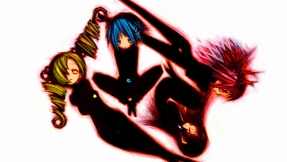
And then there’s the second twist of the series, when we realize the ‘life’ of a magical girl relied solely on the Soul Gem that Kyubey granted. To put it simply, you lose that soul gem, and you lose your life quite literally. In episode six, Madoka threw away Sayaka Miki’s Soul Gem, only to discover that by becoming a magical girl, you’re no longer quite ‘human’. Kyubey explained that by giving them the Soul Gem, the girls were given ability to defeat the witches by transferring their souls into the soul gem. Hence they were not quite ‘human’ afterwards, and that given the power they received they should not complain about it. It’s a painful lesson of opportunity cost for the young girls, as they, like us viewers, did not expect that. All of a sudden, the image of brave, powerful magical girl did not seem appealing at all. Is it worth the fight if that means you’re no longer human?
When you wish upon a Kyubey
We all have wishes, and if you happen to run into Kyubey, he’ll grant you one, in exchange of giving up your body/soul to become a magical girl that will ultimately become a witch. It sounds like a simple concept, that the world consists of a yin/yang balance. However, what shocked the characters was that they didn’t know it when they made a contract with Kyubey – the emotionless creature did not think answering important questions that were not raised was essential.
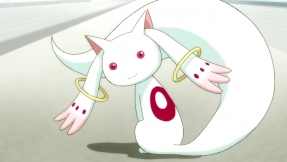 From his point of view, Kyubey did not have to tell them about it. What creatures like Kyubey were after was the energy generated by the souls of humans. They wanted to use it to counter the entropy that could cause the collapse of the universe. In this respect, Kyubey was a true utilitarian. He did not lie either – he lacked the emotion to do so, and he indeed could grant any wish the girls asked for. Thus, Kyubey also broke the image of what a ‘supporting cheerleader’ should be like. We all thought he was just a cute, little creature, but he turned out to be one of the most hated figures in anime history with his passiveness and annoyingly irrefutable logic.
From his point of view, Kyubey did not have to tell them about it. What creatures like Kyubey were after was the energy generated by the souls of humans. They wanted to use it to counter the entropy that could cause the collapse of the universe. In this respect, Kyubey was a true utilitarian. He did not lie either – he lacked the emotion to do so, and he indeed could grant any wish the girls asked for. Thus, Kyubey also broke the image of what a ‘supporting cheerleader’ should be like. We all thought he was just a cute, little creature, but he turned out to be one of the most hated figures in anime history with his passiveness and annoyingly irrefutable logic.
There was also the conflict of what the wish should be. When Kyoko Sakura was introduced, she mocked Sayaka for making a wish that did not really involve her own self, but of the boy she loved. She had a point, though. It is only human to be selfish in such situations, and while Sayaka should be praised for her selflessness, it led to her destruction later on, when the boy accepted the confession of her friend instead. It is great to have a big heart, but the premise is you need to be able to handle the outcome, however it turns out to be.
Puella Magi Homura Magica
The series title is ‘Puella Magi Madoka Magica’, but the true gem of the series came in episode ten, when we realized the main protagonist of the whole series was not Madoka, but Homura.
We were given a detailed explanation of why Homura wanted to prevent Madoka from making a contract with Kyubey. Once we knew her power was to control time, everything that happened so far seemed to make perfect sense. Unlike Yuki Nagato’s endless summer in The Melancholy of Haruhi Sumuziya, Homura could remember and feel the pain of each time loop she went through. Imagine seeing your best friend die in front of your eyes repeatedly, and your attempt to save her always fails. That was how Homura felt.
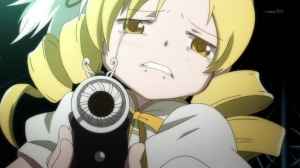 The first shot of episode ten gave viewers a shock as it presented a very shy, uneasy, soft-spoken Homura, quite contrary to how she had been acting in the past nine episodes. In fact, the original Homura resembled the Madoka we saw: indecisive, timid, with a low self-esteem. The other characters also paralleled themselves in each time loop, only with different outcomes (often shocking, such as Mami losing her mind and killing Kyoko after learning the truth behind magical girls). The constant was that Madoka died every time, and with each time loop her death became more painful and tragic, and finally turned into the most powerful witch of all time after forming a contract with Kyubey in the previous timeline. This, we also became aware, was the first scene of episode one, when Madoka dreamed about meeting Homura. Often anime leaves us clues as to what happened before the main plot took place, but the whole plot twist of Madoka’s was incredibly logical and complete that it was extremely enjoyable, despite challenging your emotions with each twist. What made Homura’s experience worse was when Kyubey suggested the reason behind Madoka’s great potential power: since she was the reason behind each time loop, Madoka had accumulated more energy/misfortune with her death in each reset. Homura’s wish to save Madoka, ultimately, became the reason why Madoka could be the greatest magical girl (and subsequently, the strongest witch) of all time. When the OP was played at the end of this episode, the uplifting melody did not excite viewers anymore. The lyrics turned out to be about Homura’s promise to Madoka during one of the time loops. The joyful beat and soft voices of ClariS turn the whole song into a depressing journey of Homura’s psychological struggle on failing to save Madoka over and over again.
The first shot of episode ten gave viewers a shock as it presented a very shy, uneasy, soft-spoken Homura, quite contrary to how she had been acting in the past nine episodes. In fact, the original Homura resembled the Madoka we saw: indecisive, timid, with a low self-esteem. The other characters also paralleled themselves in each time loop, only with different outcomes (often shocking, such as Mami losing her mind and killing Kyoko after learning the truth behind magical girls). The constant was that Madoka died every time, and with each time loop her death became more painful and tragic, and finally turned into the most powerful witch of all time after forming a contract with Kyubey in the previous timeline. This, we also became aware, was the first scene of episode one, when Madoka dreamed about meeting Homura. Often anime leaves us clues as to what happened before the main plot took place, but the whole plot twist of Madoka’s was incredibly logical and complete that it was extremely enjoyable, despite challenging your emotions with each twist. What made Homura’s experience worse was when Kyubey suggested the reason behind Madoka’s great potential power: since she was the reason behind each time loop, Madoka had accumulated more energy/misfortune with her death in each reset. Homura’s wish to save Madoka, ultimately, became the reason why Madoka could be the greatest magical girl (and subsequently, the strongest witch) of all time. When the OP was played at the end of this episode, the uplifting melody did not excite viewers anymore. The lyrics turned out to be about Homura’s promise to Madoka during one of the time loops. The joyful beat and soft voices of ClariS turn the whole song into a depressing journey of Homura’s psychological struggle on failing to save Madoka over and over again.
Hope and despair
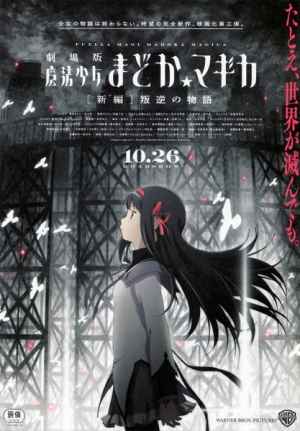 The ending of the anime thus pales a bit in comparison to this episode, which was selected as one of the ‘God-like episodes’ by Anime Contents Expo. Madoka finally made a wish to Kyubey, a move seen as salvation to Homura’s endless time loop and the world’s despair. With that, however, Madoka achieved a God-like existence, and memory of her existence was wiped from every one’s mind, save Homura. Was this the world that Homura had hoped for? Definitely not. All Homura wanted was for Madoka to live a magical girl-free life, and now, in a way, she made Madoka kill herself. Yet, Madoka’s reasoning was that she was giving Homura the hope that she had lost. When Homura almost turned herself into a witch in the final battle, it was Madoka who saved her, and made her realize she was not alone in this. In fact, she would always be with her, even if it meant Madoka was no longer human, hence the title of this episode, ‘My Very Best Friend’. In the end, Madoka’s hope was triumphant over Homura’s despair.
The ending of the anime thus pales a bit in comparison to this episode, which was selected as one of the ‘God-like episodes’ by Anime Contents Expo. Madoka finally made a wish to Kyubey, a move seen as salvation to Homura’s endless time loop and the world’s despair. With that, however, Madoka achieved a God-like existence, and memory of her existence was wiped from every one’s mind, save Homura. Was this the world that Homura had hoped for? Definitely not. All Homura wanted was for Madoka to live a magical girl-free life, and now, in a way, she made Madoka kill herself. Yet, Madoka’s reasoning was that she was giving Homura the hope that she had lost. When Homura almost turned herself into a witch in the final battle, it was Madoka who saved her, and made her realize she was not alone in this. In fact, she would always be with her, even if it meant Madoka was no longer human, hence the title of this episode, ‘My Very Best Friend’. In the end, Madoka’s hope was triumphant over Homura’s despair.
Speculations has it that the ending was changed, as after episode 10 was broadcasted Japan experienced the 3-11 Tohoku earthquake, one of the greatest tragedies to the country. No one could verify this, but the ending was also the most appropriate way to end a magical girl series that had been thoroughly torn apart, then reconstructed to become a classic anime of our time. The main theme of Madoka –the struggle between hope and despair – is what producers will explore more in the third Madoka movie: Rebellion, to be aired in late October this year. Without a doubt, it is the most anticipated anime film for all anime lovers.
Rating:
What do you think? Leave a comment.




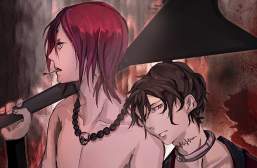
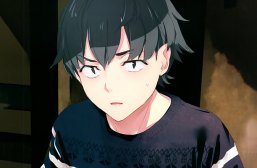

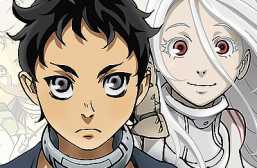
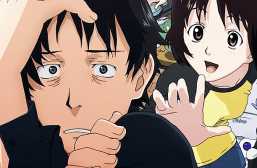
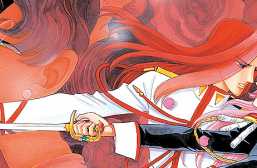
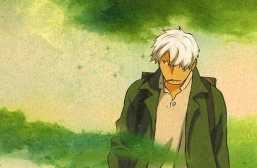
It’s a fiver for sure, great review. It has good characters and is an all around cocktail poison for us Avengelion fans.
Dont you think this has similarities to Bokurano? Its pretty addictive though, watched all 12 eps in one day! The ending was VEEERY rewarding!!
How similar are Madoke and Bokurano? I haven’t watched Bokurano so I can’t comment on that.
This was a different anime for me. The art and everything was totally not what I was used to. I watched the 1st,2nd,&3rd episode. And I was like SHIT IS GETTING REAL! Lol but this is a good anime. Though its fucking confusing the last few episodes. Like shit goes back in time.. Everything turns weird where it has you looking like DA FUQ?
Very nice. I will use this post to get my close friends to watch this series. I think my biggest problem with anime series is that they drag it out too long for the sake of fans and money. If they can tell the story in a few lines of dialogue then it shouldn’t have a whole episode. I think its ridiculous when battle fights last episodes long which is what Madoka Magica avoided, it had a good pace and story that wasn’t afraid to go somewhere new and the fans really appreciated that.
Think we can sum it up by stating that if Neon Genesis Evangelion or Fullmetal Alchemist didn’t change our entire perception of reality and how we feel about existing, then this show will.
It’s an EXISTENTIAL MASTERPIECE, hands down.
How is the new movie supposed to top the series and respect the beauty of the original ending? Urobuchi is a great writer, but at the same time, I’m so nervous…
The PVs of the new movies look attractive enough. I’m confident that Urobuchi can come up with things that we didn’t expect. There are many theories on what the new movie will be about, and I don’t recall a time when fans are so hyped about an anime (movie).
Fair review Justin. I feel one of the biggest appeals of the series are the amount (and severity) of sudden and/or unexpected problems.
I’ll download this tonight thanks. Evangelion is a classic so I will probably love this.
This series was good, that after my solid day of watching I couldn’t help but talk to everyone about it.
On a side note, I was attempting to explain to my boyfriend about the various sub-genres of Anime and Manga and he was confused how Mahou Shoujo could appeal to anyone but little girls.
I am glad I had this show to prove him wrong.
The surprise and suspense of the show is what makes it so successful – who would have thought magical girls can be this dark?
My daughter recommended this anime to me and I don’t regret watching it at all. My only concern was how she could watch it. I would not have allowed it if I knew the content.
Love the ‘kawaii’ opening theme song and the darker ending song.
I love how the opening theme song actually contains very dark and depressing lyrics, while the ending song has a positive outlook. This contrast with their respective melodies is stunning.
Interesting. I’ve only seen the songs without subs so didn’t realize this contrast.
How old is your daughter? Madoka isn’t particularly inappropriate, honestly. There’s no fanservice or sexual content, and not that even much blood, either. It’s dark, sure, but some of that’s good for kids, I think. I watched Madoka at fourteen. I once knew a twelve-year-old who liked the show.
This was a great description of the series, and review. I wanted to do a list of “Most Influencial magical girl anime” but it sounds like you’d do a better job of it – I would have to track down a whole lot of titles!anyway its something to consider 🙂
I really enjoyed reading this and look forward to the movie!!!
I don’t watch a lot of magical girls series – Madoka, Cardcaptor Sakura and the currently airing Daybreak Illusion are the only ones I’ve watched – so I’ll be interested in reading your list! It would be interesting to see the change of trend in magical girls genre over the years.
Well the anime is absolutely heart-wrenching and will basically rip out your heart and stomp on it. lol IT’s one of my favorite animes of all time.
10 stars for this anime. It starts slow, but around the end of episode three I was instantly hooked. I was also shocked, and could not stop watching.
This was NOT meant for children.
Madoka Magica was so refreshing to watch! The concepts expressed and the art style, particularly of the witches, was amazing.
I think that, while I appreciated the characters and plot, what really sold the anime to me was the beautiful animation in the witch sequences, and how adorable Kyubey is. Needless to say, I was completely horrified to find out that Kyubey was NOT simply a cute little rabbit/cat thing in the end!!
This was a fantastic review; I was actually able to convince a few friends to start watching it after I read them your line about the end of episode three being where “Faust met the Revolutionary Girl Utena in a Sailor Moon setting” (:
This show is one of my favorite examples of anime being more than just ‘a bunch of lame Japanese cartoons’ that a good majority of people tend to see it as.
Madoka Magica is not what people expect. At the surface it appears as a cheerful magical girls anime that may not break the mold of the genre. However, it is quite an innovative series with psychological undertones. It is a beautifully written show. Very nice review.
It’s quite interesting, well written, and shocking, and Homura is one of my favorite characters.
It is so well thought out. In one of the episodes Kyoko explains “witches eat the humans then magical girls kill the witches, like the circle of life” or something along those lines. My first thought is that isn’t a circle that is just a line. Later it is revealed magical girls become witches later on in the series, which completes the circle of life.
Great review! I think this, along with Princess Tutu and perhaps RGU, is one of the few magical girl shows I can latch onto. It showcases deeper themes and just has better pacing than most of it’s predecessors. Sailor Moon has its moments but could have been written tighter.
Love the review! I love this show and all the movies, AND the spin-off mangas! I am a huge fan of this series and consider it to be one of the best magical girl shows out there!
“The mouth-less Kyubey ” Yeah I’m not sure I can trust anything from someone who missed something THAT obvious, but thanks.
Regarding Sayaka’s character, selflessness does not equal self-sacrifice, which seems to be occurring here.